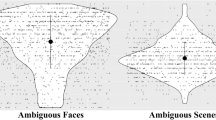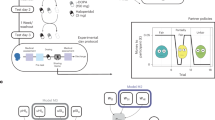Abstract
We examined the association between causal attributions and self-reported motivational negative symptoms (amotivation) in a German online community sample (n = 251). Bivariate correlations revealed significant associations between amotivation and attribution of success to external, variable, and specific causes. No associations between amotivation and failure attributions were found. Our data suggest that demotivational causal attributions of success could be a feature of amotivation and a promising target for research and intervention.
Similar content being viewed by others
Demotivating beliefs play a crucial role in amotivation, a core aspect of many forms of psychopathology, most notably as a negative symptom of schizophrenia1,2. As a negative symptom in schizophrenia it represents the extreme end of a continuum that can be observed in the general population3,4,5 and that has a dimensional trait-like component (i.e., as part of negative schizotypy). Cognitive models assume that demotivating beliefs form in response to repeated experiences of failure1. However, little is known about how this process unfolds. We propose that causal attributions, defined as the explanations one has regarding the cause of past events6, are an important explanatory factor for how experiences transform into demotivating beliefs. More specifically, when a person tends to attribute failure to internal, stable, or global causes and success to external, variable, or specific causes, demotivating beliefs (e.g., “If I fail at my work, then I am a failure as a person.”) are a likely consequence. A tendency to internalize failure and to externalize success was found in association with elevated negative symptoms in schizophrenia7. However, no study so far has investigated the putative relationship of amotivation and the attributional dimensions stability and globality.
We hypothesized that (a) attributing failure to internal, stable, and global causes and (b) attributing success to external, variable, and specific causes is associated with higher levels of amotivation (i.e., low experienced and anticipated pleasure and low motivation for social, recreational, and vocational activities).
We analyzed the associations between different attributional styles (Attributional Style Questionnaire (ASQ8), self-reported positive (Community Assessment of Psychic Experiences, positive symptoms, CAPE-POS4) and depressive symptoms (Center for Epidemiological Studies—Depression Scale, CES-D9) and amotivation (Motivation and Anticipation of Pleasure—Self Report, MAP-SR10) in correlation analyses. The data came from a convenience online community sample (n = 251; see Table 1 for sample characteristics, Table 2 for correlation analyses and supplemental material for trial flow chart [Supplemental Fig. S1], data cleansing procedures, and additional sample characteristics [Supplemental Table S1], as well as for results and a supplementary discussion of multiple regression analyses for each attributional variable included as predictor alongside depression and positive symptoms as additional covariates and with amotivation as dependent variable [Supplemental Table S2]). For all analyses the Bonferroni corrected p-value of 0.00064 has been used to account for family-wise error accumulation.
There was no significant association between higher levels of amotivation and the attribution of failure to internal (r = -0.003, p = 0.9670), stable (r = 0.146, p = 0.0205), or global causes (r = 0.101, p = 0.1099). Higher levels of amotivation were significantly associated with the attribution of success to less internal (r = -0.370, p < 0.0001), less stable (r = -0.270, p < 0.0001), and less global causes (r = -0.278, p < 0.0001). These results were robust against additionally controlling for depression and positive symptoms in regression models (see Table S2 in the supplemental material). All effect sizes are classified as small to moderate11.
There was no significant association between amotivation and positive symptoms (r = 0.146, p = 0.0206). Higher levels of positive symptoms were significantly correlated with attributing failure to more global causes (r = 0.227, p = 0.0003) with a small to moderate effect size11, but not with any other attributional style. Higher levels of depressive symptoms were significantly associated with the attribution of success to less internal (r = -0.219, p = 0.0005) causes and with the attribution of failure to more global causes (r = 0.235, p = 0.0002), each with a small to moderate effect sizes11. There were no significant associations between symptoms of depression and any other attributional style. It needs noting that higher levels of amotivation were significantly correlated with higher levels of depressive symptoms (r = 0.527, p < 0.0001) with a large effect size11.
Our data thus do not fully confirm our hypotheses derived from cognitive models of negative symptoms1,2 and earlier findings7 which had suggested that a particular attributional style for failure was related to amotivation. Instead, our data suggest that global attributions of failure are more specific to depressive symptoms, matching long-known attributional tendencies in depression12.
Higher levels of amotivation were, however, associated with attributing success to external, stable, and global causes. Accordingly, people who view achieving positive outcomes as unattached to their own actions, or as an outlier that is not predictive of future events or related to outcomes of similar events, may be more likely to develop motivational problems. This type of attribution prevents successes from challenging pre-existing demotivating beliefs, such as low expectations for success1,2, and can explain why people with motivational negative symptoms show inhibited learning from positive outcomes13. Against our theoretical assumptions, amotivation was not associated with any attributional styles of failure.
This is the first study to specifically target associations between the attributional dimensions of internality, stability, and globality and amotivation. To corroborate our findings of dysfunctional external, variable, and specific success attributions in amotivation, future research needs to address the limitations of our study (i.e., sample demographics are not representative of schizophrenia samples; assessing amotivation via self-report and not via expert rating, with the MAP-SR having disputed construct validity regarding amotivation; cross-sectional design). Moreover, particularly in community samples, other aspects of psychopathology are known to overlap with self-reported negative symptoms (e.g., depression14). Given that, in our data depression and amotivation were highly correlated and can thus not be distinguished sufficiently, a replication in clinical samples may help disentangle the differential contributions of these two aspects of psychopathology. Further research is also required to investigate whether dysfunctional success attributions play a causal role in the formation and maintenance of clinical motivational negative symptoms. If this were the case, reattribution training specifically for strengthening internal, stable, and global attributions of success could become a promising addition to cognitive interventions for motivational negative symptoms to reinforce people’s sense of agency.
Methods
This online study was implemented from 06/2019 to 07/2019 in EFS Survey (Questback GmbH, 2017) and approved by the local ethics committee of Universität Hamburg (AZ: 2019_232_Butschbach). Participants were recruited from the community via leaflets and a variety of internet platforms (see Table 1 and supplemental material for detailed information on recruitment). The only inclusion criterion was an age of at least 18 years. The online survey took about 30 min and included written informed consent, assessments of sociodemographic variables, symptom questionnaires (MAP-SR, CAPE-POS, CES-D), and the ASQ. The ASQ requires participants to formulate a causal explanation for hypothetical positive and negative situations in a free-text field and rate it on the dimensions internal vs. external, stable vs. variable, and global vs. specific with two items each. The data were analyzed with a series of Bonferroni-corrected correlation analyses. See the supplement for further information on the instruments used.
Data availability
All research data and the codebook needed to reproduce the analyses and findings of this study are publicly available for non-commercial scientific use at https://doi.org/10.23668/psycharchives.14147.
References
Beck, A. T., Rector, N. A., Stolar, N. & Grant, P. A cognitive conceptualization of negative symptoms. in Schizophrenia. Cognitive theory, research, and therapy (eds. Beck, A. T., Rector, N. A., Stolar, N. & Grant, P.) 142–158 (Guilford Press, 2011).
Pillny, M., Krkovic, K. & Lincoln, T. M. Development of the demotivating beliefs inventory and test of the cognitive triad of amotivation. Cognit. Ther. Res. 42, 867–877 (2018).
Linscott, R. J. & van Os, J. Systematic reviews of categorical versus continuum models in psychosis: Evidence for discontinuous subpopulations underlying a psychometric continuum. Implications for DSM-V, DSM-VI, and DSM-VII. Annu. Rev. Clin. Psychol. 6, 391–419 (2010).
Stefanis, N. C. et al. Evidence that three dimensions of psychosis have a distribution in the general population. Psychol. Med. 32, 347–358 (2002).
Van Os, J., Linscott, R. J., Myin-Germeys, I., Delespaul, P. & Krabbendam, L. A systematic review and meta-analysis of the psychosis continuum: Evidence for a psychosis proneness-persistence-impairment model of psychotic disorder. Psychol. Med. 39, 179–195 (2009).
Heider, F. The psychology of interpersonal relations. (John Wiley & Sons Inc, 1958). https://doi.org/10.1037/10628-000.
Lincoln, T. M., Mehl, S., Kesting, M. L. & Rief, W. Negative symptoms and social cognition: Identifying targets for psychological interventions. Schizophr. Bull. 37, 23–32 (2011).
Peterson, C. et al. The attributional style questionnaire. Cognit. Ther. Res. 6, 287–299 (1982).
Radloff, L. S. The CES-D scale: A self-report depression scale for research in the general population. Appl. Psychol. Meas. 1, 385–401 (1977).
Llerena, K. et al. The Motivation and Pleasure Scale–Self-Report (MAP-SR): Reliability and validity of a self-report measure of negative symptoms. Compr. Psychiatry 54, 568–574 (2013).
Cohen, J. Statistical power analysis for the behavioral sciences. (Lawrence Erlbaum Associates Publishers, 1988).
Sweeney, P. D., Anderson, K. & Bailey, S. Attributional style in depression: A meta-analytic review. J. Pers. Soc. Psychol. 50, 974–991 (1986).
Strauss, G. P., Waltz, J. A. & Gold, J. M. A review of reward processing and motivational impairment in schizophrenia. Schizophr. Bull. 40, 107–116 (2014).
Richter, J., Hölz, L., Hesse, K., Wildgruber, D. & Klingberg, S. Measurement of negative and depressive symptoms: Discriminatory relevance of affect and expression. Eur. Psychiatry 55, 23–28 (2019).
Acknowledgements
We thank all participants for participating in our research. This research did not receive any specific grant from funding agencies in the public, commercial, or not-for-profit sectors.
Funding
Open Access funding enabled and organized by Projekt DEAL.
Author information
Authors and Affiliations
Contributions
AS and TL designed the study. AS and KB recruited the participants. AS and KB managed the literature searches. AS undertook the statistical analyses. AS wrote the first draft of the manuscript under supervision of MR. All authors contributed to and have approved the final manuscript.
Corresponding author
Ethics declarations
Competing interests
All authors declare no competing interests.
Additional information
Publisher’s note Springer Nature remains neutral with regard to jurisdictional claims in published maps and institutional affiliations.
Supplementary information
Rights and permissions
Open Access This article is licensed under a Creative Commons Attribution 4.0 International License, which permits use, sharing, adaptation, distribution and reproduction in any medium or format, as long as you give appropriate credit to the original author(s) and the source, provide a link to the Creative Commons licence, and indicate if changes were made. The images or other third party material in this article are included in the article’s Creative Commons licence, unless indicated otherwise in a credit line to the material. If material is not included in the article’s Creative Commons licence and your intended use is not permitted by statutory regulation or exceeds the permitted use, you will need to obtain permission directly from the copyright holder. To view a copy of this licence, visit http://creativecommons.org/licenses/by/4.0/.
About this article
Cite this article
Schormann, A.L.A., Butschbach, K., Lincoln, T.M. et al. Dysfunctional attributions of success as a distinct feature of amotivation. Schizophr 10, 15 (2024). https://doi.org/10.1038/s41537-024-00441-9
Received:
Accepted:
Published:
DOI: https://doi.org/10.1038/s41537-024-00441-9



